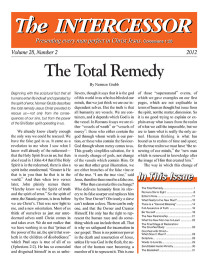
What the New Man has to Learn
More Articles from The Intercessor, Vol 28 No 2
- The Total Remedy
- Romans Six to Eight
- The Editor’s Note
- What Really Is the New Man?
- A Vessel for Honor
- There is a "Second Blessing."
- Full Assurance of Faith
- Make every effort to enter that rest
- Be Yourself
- The New Relationship
- What the New Man has to Learn
- The Final Stage of Restoration: The Crucified Body
- Crucified with Christ–What Does It Mean?
- Crucified with Christ
- Words to Live By…
- From Desperation to Restoration





